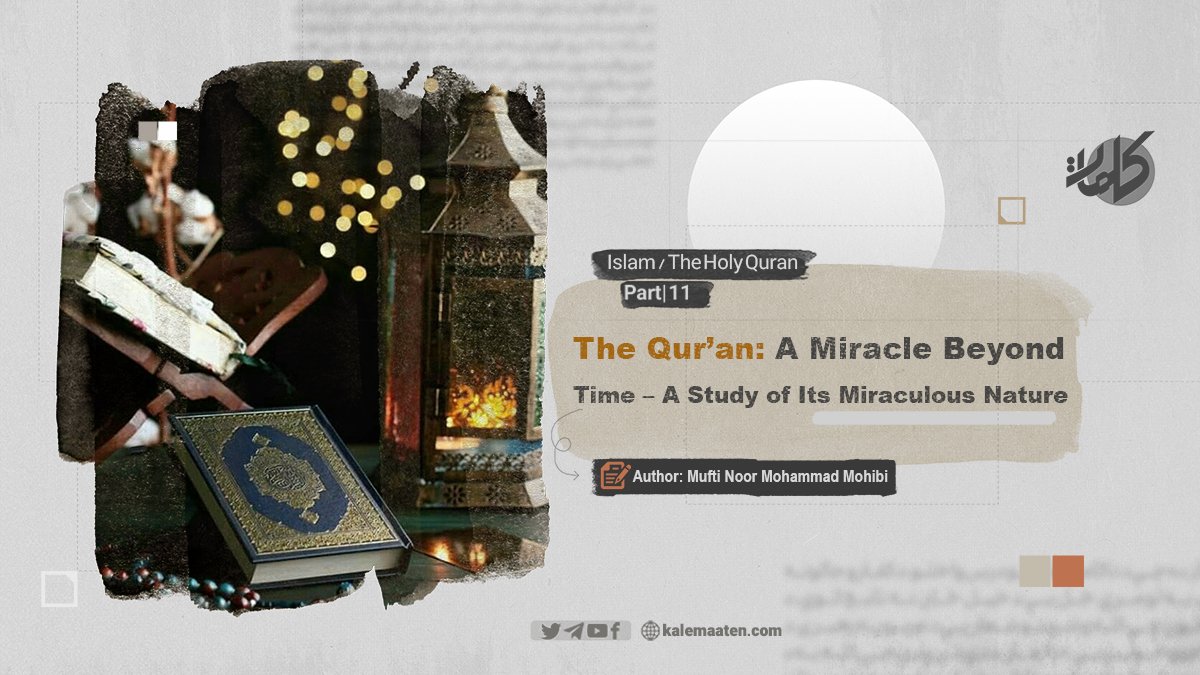Author: Mufti Noor Mohammad Mohibi
The Qur’an: A Miracle Beyond Time- A Study of Its Miraculous Nature (Part 11)
The Inimitability of the Qur’anic Style: A Unique Structure in the History of Language
The style of expression in the Holy Qur’an has always amazed scholars, eloquent speakers, and thinkers since its revelation. It neither fits into the form of poetry nor conforms to the framework of conventional prose; rather, the Holy Qur’an possesses a distinctive style for which there is no parallel in the Arabic language or in world literature. This characteristic is called the “Miraculous Style of the Qur’an.”
Definition of Uslūb in Language and Literature:
In the science of rhetoric (balāghah), uslūb refers to the distinctive manner of expression used by a speaker or writer, including their choice of vocabulary, sentence structure, tone, rhythm, and the arrangement of thoughts. [1]
The Qur’anic uslūb refers to a set of linguistic, syntactic, rhythmic, and semantic characteristics that are seen throughout the Qur’an and which set it apart from all other Arabic texts. [2]
Characteristics of the Qur’anic Style (Uslub)
The style of the Qur’an stands apart from other Arabic texts because of its unique fusion of prose and poetry, and possesses the following singular traits:
Non-conformity to Traditional Arabic Prose or Poetry
In classical Arabic literature, texts were either poetic—adhering to metrical patterns and rhyme—or prose—either plain or rhythmic (sajʿ).
But the Qur’an transcends both these forms: It is neither metrically rhythmic like the poetry of the pre-Islamic Jahliyah period, nor devoid of musicality and rhythm like ordinary prose.
In the words of Allamah al-Busti: “It is speech unlike any other speech; all attempts to rival it fall short, and all aspirations to match it are cut off.” [3]
One prominent feature of this style is its organized rhythm and harmonious cadence, even without full poetic rhyme.
Surahs such as Ar-Rahman and Al-Waqi‘ah exemplify this rhythmic and melodic excellence.
Stylistic Diversity with Structural Unity
The Qur’an employs a wide variety of expressions: quotations, dialogues, narratives, commands, prohibitions, supplications, encouragements, warnings, and reasoning. Despite this diversity, its overall style remains unified and consistent.
The Qur’an also utilizes short, long, compound, and simple sentences alongside one another—creating a dynamic and captivating rhythm.
Moreover, imperative, declarative, exclamatory, and conditional sentences are alternated skillfully, adding to the literary appeal. [4]
Verbal Balance and Spiritual Musicality
The Qur’an masterfully balances sound patterns, phonetic harmony, and deep meanings. For example: (إِنَّا أَعْطَيْنَاكَ ٱلْكَوْثَرَ فَصَلِّ لِرَبِّكَ وَٱنْحَرْ إِنَّ شَانِئَكَ هُوَ ٱلْأَبْتَرُ) Translation: “Indeed, we have granted you al-Kawthar. So, pray to your Lord and sacrifice. Indeed, your enemy is the one cut off.” (Surah al-Kawthar: 1–3)
In just three brief verses, the surah conveys profound meaning, while also possessing a beautiful musical rhythm. [5]
Masterful Use of Conciseness and Elaboration
The Qur’an sometimes uses conciseness (ījāz) to convey vast meanings in a few words, such as: (وَلَكُمْ فِي ٱلْقِصَاصِ حَيَوٰةٌ) Translation: “And for you in retribution, there is life.” (Surah al-Baqarah: 179)
And at other times, it uses elaboration (iṭnāb) to expand on ideas with grandeur—particularly in verses about divine oneness (Tawhid) and the attributes of Allah. Both styles are employed according to the demands of context.
Unparalleled Use of Literary Beautifications
The Qur’an employs nearly all literary devices of rhetoric, such as:
Repetition, for emphasis and reinforcement of meaning;
Ambiguity (īhām) and apparent contradiction, which resolve upon reflection;
Metaphor, allegory, contrast, and simile—all used with precise relevance to the subject. [6]
Manifestations of the Qur’an’s Stylistic Inimitability
Unique Beginnings and Endings of Surahs
The Qur’an often opens with oaths, supplications, and distinctive phrases not found in any other literature, such as: (ٱلْـحَمْدُ لِلَّهِ رَبِّ ٱلْعَٰلَمِينَ) Translation: (“All praise is due to Allah, Lord of the worlds”) – Surah al-Fatiḥah: 2 (وَٱلشَّمْسِ وَضُحَىٰهَا) Translation: “By the sun and its morning brightness”) – Surah ash-Shams: 1
Use of Composite Rhetorical Structures
This includes:
Special syntactic constructions.
Intentional ellipses and concise expressions.
Delicate alliterations and unconventional rhymes.
For example: (وَفَٰكِهَةً وَأَبًّا مَّتَٰعًا لَّكُمْ وَلِأَنْعَامِكُمْ) Translation: “And fruits and herbage – a provision for you and your livestock.” (Surah ‘Abasa: 31–32)
Sample Analysis of Qur’anic Style:
Surah Ar-Rahman:
This surah stands out due to:
The repetition of the verse: (فَبِأَيِّ آلَاءِ رَبِّكُمَا تُكَذِّبَانِ) Translation: “So which of your Lord’s favors will you both deny?” which provides both musical rhythm and emphatic reinforcement.
The use of contrast between divine blessings and punishments.
Structural variation from declarative to imperative to interrogative forms.
All of this makes the verses not only pleasing to hear, but also deeply impactful and memorable. [7]
Conclusion
In summary, the Qur’an, by virtue of its unparalleled eloquence, expansive rhetoric, deep literary inimitability, and distinctive style, stands as a miracle beyond human capability.
These elements together not only make the Qur’an spiritually and morally transformative but also render it an unmatched literary model in the world of language and literature.
Continues…
Previous Part / Next Part
References:
[1]. Dalā’il al-Iʿjāz, p. 296: “Al-uslūb is a type of composition and method of structuring speech.”
[2]. Al-Itqān fī ʿUlūm al-Qurʾān, 4/13.
[3]. Bayān Iʿjāz al-Qurʾān, p. 25.
[4]. Tafsīr al-Rāzī, 28/189.
[5]. See introduction to Khāṭirah Kūrabī bar Nāẓimah Shāṭibī.
[6]. Discussed by many scholars, notably Imam Jalāl al-Dīn al-Suyūṭī in Al-Itqān fī ʿUlūm al-Qurʾān.
[7]. Al-Nazm al-Balāghī fī al-Qur’ān al-Karīm by Muḥammad ibn ʿAlī al-Shinqīṭī.



